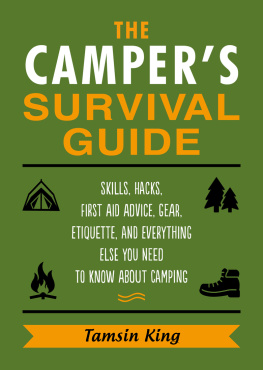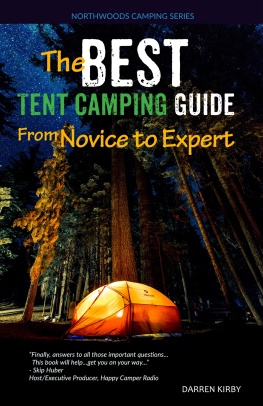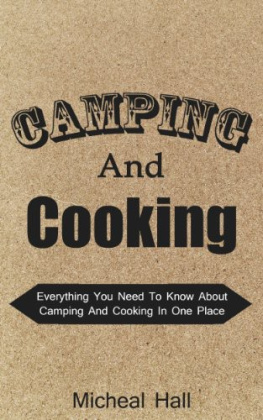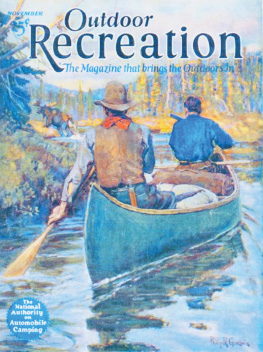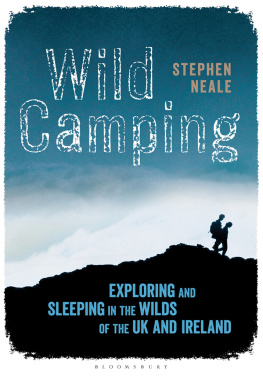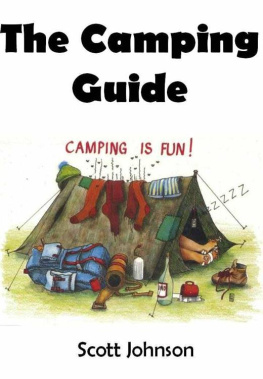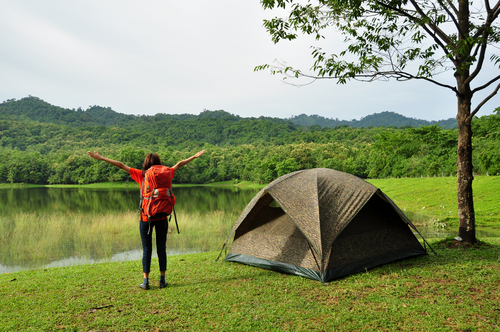Copyright 2021 - All rights reserved.
It is not legal to reproduce, duplicate, or transmit any part of this document in electronic means or printed format. Recording of this publication is strictly prohibited. Any storage of this document is not allowed unless with written permission from the publisher except for the use of brief quotations in a book review.
Wild Camping - The Ultimate Adventure
Why not venture into the unknown and enjoy natural surroundings on a wild camping adventure? By doing so, youll be taking in new experiences that will satisfy your physical and spiritual self.
Wild camping allows you the relative freedom to choose a location to camp that suits you best. To make the most of it, you only have to follow a few fundamental principles. Leave no trace youve been there, respect the local people, nature, and wildlife, and dispose of waste appropriately. Create only a small campsite footprint, keep noise to a minimum, and camp a reasonable distance from a water source to avoid polluting it. Being mindful of these few things will go a long way in defining an experience you will never forget. These principles can change somewhat in different locations in countries around the world, but if you observe them as core values, youre not likely to go wrong.
For a fantastic experience every time you go wild camping, read on, and you will find detailed information on every aspect of this fascinating pastime. Feed your curiosity, plan, dare, and camp in the wilderness - fearlessly and confidently.
Wild camping is a thrilling pursuit. It appeals to those adventurers who are always on the lookout for an eco-friendly expedition into the beauty of the natural world. Although the planning may seem rather detailed to start with, wild camping is quite simple. Furthermore, the experience will encourage you to travel further into the wilderness; the peace and loveliness of nature inspires most of us to explore the unknown.
Several laws govern wild camping. You need the landowners permission to be able to set up your campsite. You dont want to set up camp in a place where you may be inadvertently trespassing onto another individuals property. Legal complexities mostly stem from the differences in legal constraints in geographically dispersed regions.
Wild camping is also known as freedom camping, dry camping, or free camping. The term wild camping may mean different things to different people. For some, it may mean staying in a recreational vehicle and enjoying a relaxed stay off the beaten track. For others, it can be much more of an adventure, hiking, cycling, or travelling in other ways to a remote location and setting up a hammock, bivvy bag, or tent, and experiencing the essences of nature. The qualities you require to be a wild camper are self-reliance, safety, and environmental responsibility. Individuals planning on wild camping must understand the risks. They must organise soundly and make preparations for the journey and the campsite.
Throughout this book, we will regularly remind you of the many essential aspects of wild camping. This way, youll get the best from a wild camping adventure and return home safely. You will be wild camping in the safest and most enjoyable ways before you know it.
Overview of places to camp
An important concept to understand is the right to access. This refers to setting up your tent anywhere in an uncultivated place. Sometimes, you dont have a choice but to go to a campsite designated for the purpose. At other times, you may choose to camp on, or along, a roadside if the country permits this. Here are some examples:
Europe
European rules and regulations on wild camping can vary. France allows wild camping on private land and requires the consent of the owner. Sweden allows wild camping for a couple of days. In England and Wales, the land is mostly privately owned, and landowners are mainly responsible for allowing earnest campers. Dartmoor National Park usually allows wild camping, but on occasion enforces temporary bans, as is the case in many areas throughout the UK. Scotland permits wild camping for a few days. Technically, even though wild camping in Scotland is not outright banned, it is still essential to check up to date rules and regulations. It is a good idea to check the latest mandates for any country where you plan to camp. In Norway, wild camping is allowed in all places that have the right to roam and access. Romania also allows wild camping. But permission must still be granted by the landowner. Wild camping is legal in Turkey, and Slovakia allows it only in certain areas.
In Ireland, Spain, France, and Portugal, the rules are similar to Wales and England. It is not a good idea to camp on private land without the permission of the local landowner. You cannot camp in regional and national natural parks; this is for the protection of wildlife. Wild camping is also not tolerated in Germany and Italy.
USA and Canada
In Canada and the USA, national, local, and state governments oversee the management of land. It is essential to perform research about the landowner before settling for a place to wild camp. You need to make sure you are not trespassing on anyones land. In BLM (Bureau of Land Management) or Forest Service areas, wild camping is known as dispersed camping.
New Zealand and Australia
In New Zealand and Australia, you could receive a fine if you set up your camp in the wrong place. Australia has different rules for each of its states. Finding land without restrictions is difficult. Only those areas designated as rest areas may be utilised for camping. That being said, camping is still very much a national pastime in these countries.
Legal implications of wild camping
The Land Reform Act of 2003 allows non-motorised public access in Scotland. Camping on unenclosed land is permitted legally. A few restrictions exist on overnight camping. You are likely to receive the most information from the Scottish Outdoor Access Code. There is no wild camping law about being able to set up your camp on the property of another individual in the UK. The current legislation in the UK rules pertains mostly to what gipsies, migratory groups, and travellers are supposed to do concerning parking on land along with caravans and vehicles. Any attempts to trespass on a specific area of land would fall under a civil offence.
Wales, England, Northern Ireland, and Scotland have very different rules and regulations related to the practice. Most land in England and Wales is owned by either a company, an individual, or am organisation. Pitching a tent, bivvy bag, or hammock without the owners permission is regarded as trespassing.
The Right to Roam was prominent legislation that mandated large areas of land to be open to public access. In Scotland, the Scottish Outdoor Access Code is the legal framework determining land access in Scotland. The basis of the Scottish Outdoor Access Code is the Land Reform Act of Scotland and defines the right to access water and land.



